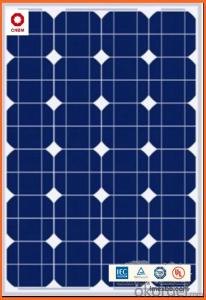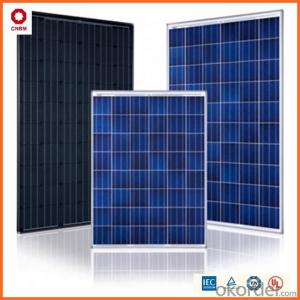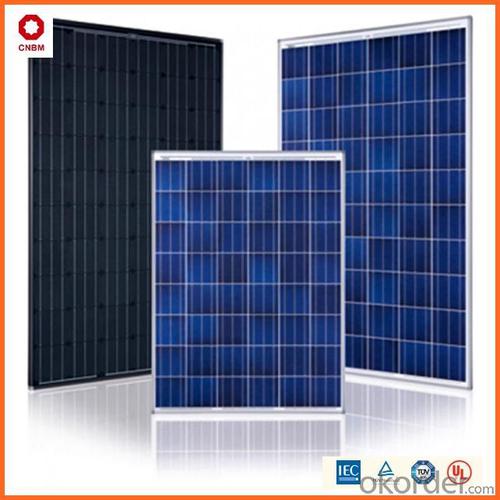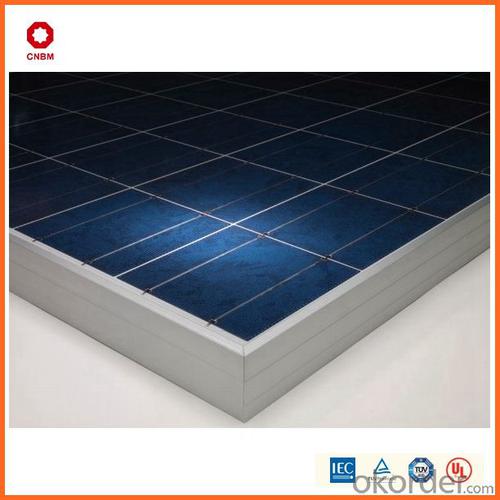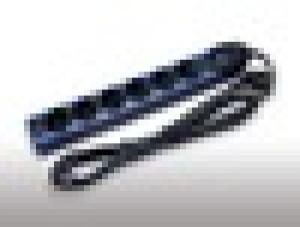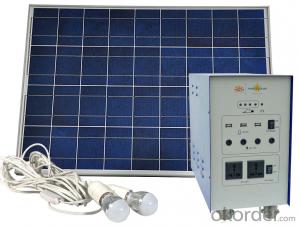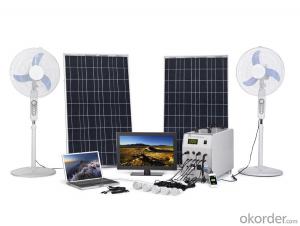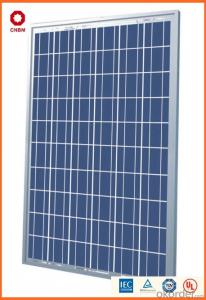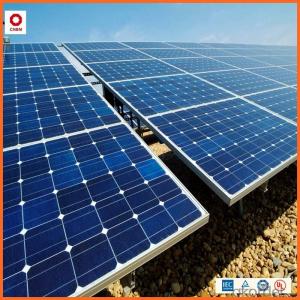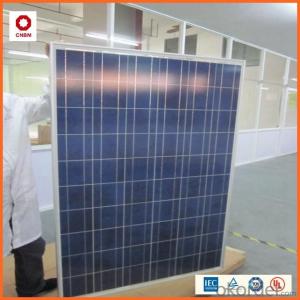Residential Solar Energy Systems:Small Solar Panel 45w with Good Quality - Hot on Sale!!!
- Loading Port:
- China main port
- Payment Terms:
- TT OR LC
- Min Order Qty:
- 1 watt
- Supply Capability:
- 10000000 watt/month
OKorder Service Pledge
OKorder Financial Service
You Might Also Like
Product Description:
Hot Sale !!! Quality and Safety of Small Poly Solar Panel 35~85w
1. Rigorous quality control meets the highest international standards.
2. High-transmissivity low-iron tempered glass, strong aluminium frame.
3. Using UV-resistant silicon.
4. IS09001/14001/CE/TUV/UL
Warranties of Small Poly Solar Panel 35~85w
1. 10 years limited product warranty
2. 15 years at 90% of the minimal rated power output
3. 25 years at 80% of the minimal rated power output
Technical date of 45w-85w Poly Solar Panel
ITEM NO.: | Mono 125*125 cell ,36pcs . Power range from 80Wp-100Wp | ||||||||
Maximum Power(W) | 80 | 85 | 90 | 95 | 100 | ||||
Optimum Power Voltage(Vmp) | 17.81 | 17.89 | 17.94 | 17.99 | 18.06 | ||||
Optimum Operatige Current(Imp) | 4.78 | 4.91 | 5.12 | 5.35 | 5.59 | ||||
Open Circuit Voltage(Voc) | 21.98 | 22.05 | 22.14 | 22.28 | 22.45 | ||||
Short Circuit Current(Isc) | 4.95 | 5.15 | 5.36 | 5.65 | 5.84 | ||||
Solar Cell: | 125*125 Mono | ||||||||
Number of Cell(pcs) | 4*9 | ||||||||
Brand Name of Solar Cells | JA Cell, Bluesun Cell | ||||||||
Size of Module(mm) | 1580*808*35 | ||||||||
Caple & Connector Type | Pass the TUV Certificate | ||||||||
Frame(Material Corners,etc.) | Aluminium-alloy | ||||||||
Backing (Brand Type) | TPT | ||||||||
Cell Efficiency for 100W(%) | 15.8% | ||||||||
Weight Per Piece(KG) | 12.0KG | ||||||||
FF (%) | 70-76% | ||||||||
Junction Box Type | Pass the TUV Certificate | ||||||||
Tolerance Wattage(e.g.+/-5%) | ±3%, or 0-3% | ||||||||
Front Glass Thikness(mm) | 3.2 | ||||||||
Temperature Coefficients of Isc(%) | +0.04 | ||||||||
Temperature Coefficients of Voc(%) | -0.38 | ||||||||
Temperature Coefficients of Pm(%) | -0.47 | ||||||||
Temperature Coefficients of Im(%) | +0.04 | ||||||||
Temperature Coefficients of Vm(%) | -0.38 | ||||||||
Temperature Range | -40°C to +85°C | ||||||||
Surface Maximum Load Capacity | 2400Pa | ||||||||
Allowable Hail Load | 23m/s ,7.53g | ||||||||
Bypass Diode Rating(A) | 12 | ||||||||
Warranty | 90% of 10 years,80% of 25 years. | ||||||||
Standard Test Conditions | AM1.5 1000W/ 25 +/-2°C | ||||||||
Packing | carton or pallet | ||||||||
1*20' | 25 Pallets / 450pcs | ||||||||
1*40'STD | 25 Pallets / 100pcs | ||||||||
Features of our products:
• High conversion efficiency mono/poly-crystalline amorphous silicon solar cells
• Modules incorporate high performance bypass diodes to minimize the power drop caused by shading
• High transmittance, low-iron tempered glass
• High performance EVA encapsulant to prevent destroying and water.
• AI frame: without screw, corner connection. 8 holes on the frame can be installed easily
• Good performance of preventing from atrocious weather such as wind and hails
• Certifications: CE IEC TUV VDE UL, Class I
• 10 years 90% power output warranty

Shipping of Small Poly Solar Panel 35~85w
By Sea | Delivery from Shanghai or Ningbo seaport |
By Air | Departure from Shanghai Pudong Airport |
By Express | Post by DHL, EMS, UPS, TNT. |
- Q: Can solar energy systems be installed on the ground?
- Yes, solar energy systems can be installed on the ground. In fact, ground-mounted solar systems are a popular choice for both residential and commercial applications. These systems typically consist of solar panels mounted on a structure or framework that is anchored to the ground. Ground-mounted systems offer several advantages over rooftop installations, such as increased flexibility in system design, easier access for maintenance and cleaning, and the ability to optimize the orientation and tilt angle of the panels for maximum energy production. Additionally, ground-mounted systems can be installed in areas with limited roof space or where the roof is not suitable for solar panel installation. Overall, ground-mounted solar energy systems provide a practical and efficient way to harness the power of the sun for electricity generation.
- Q: How do solar energy systems impact the structural integrity of a building?
- Solar energy systems have a minimal impact on the structural integrity of a building. In fact, they are designed to be installed on rooftops or as standalone structures without compromising the structure's stability. The weight of solar panels is relatively light, and modern technologies have made them even lighter than before. The panels are typically mounted on racks or frames that distribute the weight evenly across the surface area. Additionally, roof-mounted solar panels are usually installed with the help of professional engineers who ensure that the load is properly distributed and does not exceed the roof's weight-bearing capacity. Moreover, solar panels act as a protective layer for the roof by shielding it from direct sunlight, rain, and other weather elements. This can actually extend the lifespan of the roof by preventing UV damage and reducing the thermal stress caused by extreme temperatures. In some cases, additional reinforcement may be required, especially for installations on older buildings or in areas prone to seismic activity or heavy snow loads. However, these considerations are part of the installation process and are taken into account by experienced professionals. Overall, solar energy systems have a negligible impact on the structural integrity of a building and can even provide added protection to the roof. They are designed to be safe, reliable, and durable, ensuring the long-term stability and sustainability of the building.
- Q: What is the difference between a solar thermal system and a photovoltaic system?
- Solar energy systems come in different forms, such as solar thermal and photovoltaic systems, each serving distinct purposes. When it comes to heating, a solar thermal system takes the lead. It operates by harnessing the sun's energy and directly heating water or air. This is achieved through the use of solar collectors, which absorb sunlight and convert it into heat. The heated water or air can then be utilized for space heating, water heating, or even powering turbines to generate electricity. These systems are commonly utilized in residential, commercial, and industrial settings to provide efficient heating solutions. On the other hand, photovoltaic systems, often referred to as solar panels, are primarily designed to generate electricity. They make use of photovoltaic cells, typically composed of silicon, to directly convert sunlight into electrical energy through the photovoltaic effect. These cells are interconnected within solar panels, and multiple panels can be combined to create a complete photovoltaic system. The electricity produced by a photovoltaic system can be utilized to power electrical devices, appliances, or even be fed into the grid to offset energy consumption. To summarize, the key distinction between a solar thermal system and a photovoltaic system lies in their respective functions. While solar thermal systems focus on heating applications by directly utilizing the sun's energy to heat water or air, photovoltaic systems are specifically designed to generate electricity through the conversion of sunlight into electrical energy using solar panels.
- Q: What are the advantages of solar energy systems?
- Solar energy systems have several advantages. Firstly, they are a renewable source of energy, meaning they can be used indefinitely without depleting natural resources. Secondly, solar energy systems reduce dependence on fossil fuels, promoting a cleaner and more sustainable environment. Additionally, solar energy is abundant and widely available, making it accessible to a larger population. Moreover, solar power systems require minimal maintenance and have a long lifespan, resulting in cost savings over time. Finally, solar energy systems can provide energy independence, allowing individuals and communities to generate their own electricity and reduce their reliance on the grid.
- Q: Can solar energy systems be used in areas with high levels of poverty?
- Yes, solar energy systems can be used in areas with high levels of poverty. In fact, solar energy is often considered a viable solution for providing affordable and sustainable electricity to underserved communities. Solar power can reduce reliance on traditional energy sources, lower energy costs, and provide a reliable source of electricity even in remote areas. Additionally, solar energy systems can be implemented on a small-scale basis, allowing individuals and communities to gradually adopt this renewable energy source according to their needs and financial capabilities. Overall, solar energy has the potential to greatly benefit areas with high levels of poverty, promoting economic development and improving living conditions.
- Q: Can solar energy systems be installed on industrial facilities?
- Yes, solar energy systems can be installed on industrial facilities. In fact, many industrial facilities have already adopted solar energy as a viable and sustainable source of power. These systems can significantly reduce energy costs, decrease reliance on fossil fuels, and contribute to a greener and more sustainable future for industrial operations.
- Q: What is the lifespan of a solar energy system?
- The lifespan of a solar energy system typically ranges from 25 to 30 years, but with proper maintenance, it can last even longer.
- Q: Can solar energy systems be used in areas with high levels of hail or other severe weather conditions?
- Yes, solar energy systems can be used in areas with high levels of hail or other severe weather conditions. However, it is important to select appropriate materials and design the system to withstand these conditions. For instance, using hail-resistant panels, positioning them at an angle, and employing protective measures can help mitigate the potential damage caused by hail or severe weather. Proper maintenance and insurance coverage are also advisable to ensure the longevity and efficiency of the solar energy system in such areas.
- Q: Can a solar energy system be used in areas prone to hurricanes or tornadoes?
- Solar energy systems can indeed be utilized in regions that are susceptible to hurricanes or tornadoes. Although these natural calamities can potentially inflict harm on solar panels and other system components, employing appropriate preparation and installation methods can alleviate these risks. The design and structural integrity of solar panels themselves are crucial considerations. High-quality panels are constructed to withstand powerful winds and extreme weather conditions. They undergo rigorous testing and certification processes to meet specific standards, including wind resistance ratings. In hurricane or tornado-prone areas, it is essential to install panels explicitly engineered to endure the potential wind speeds and impacts associated with these events. Furthermore, employing proper installation techniques can enhance the resilience of a solar energy system. For instance, utilizing reinforced mounting structures, securing panels with additional brackets or fasteners, and ensuring secure connections between panels, inverters, and batteries can prevent damage caused by strong winds or airborne debris. In certain cases, homeowners may opt to invest in solar panel tracking systems that automatically adjust panel positions to minimize wind resistance during severe weather occurrences. This feature protects the panels and increases their likelihood of surviving hurricanes or tornadoes with minimal damage. Moreover, having a backup power storage system, such as batteries, is essential to ensure uninterrupted power supply during and after severe weather events. This backup system stores excess energy generated by the solar panels, enabling the system to function independently of the grid during power outages caused by hurricanes or tornadoes. Overall, although there are risks associated with utilizing a solar energy system in hurricane or tornado-prone areas, careful planning, proper installation, and the use of resilient components allow for the harnessing of solar power even in these challenging environments.
- Q: Do solar energy systems require specialized cleaning?
- Yes, solar energy systems do require specialized cleaning. While solar panels are designed to be self-cleaning to some extent, they can still accumulate dirt, dust, pollen, bird droppings, and other debris over time, which can reduce their efficiency. Regular cleaning is necessary to ensure optimal performance. However, cleaning solar panels can be a delicate task, as they are made of sensitive materials. Using the wrong cleaning products or techniques can damage the panels and void their warranty. Therefore, it is recommended to hire professionals or follow the manufacturer's guidelines for cleaning solar energy systems.
Send your message to us
Residential Solar Energy Systems:Small Solar Panel 45w with Good Quality - Hot on Sale!!!
- Loading Port:
- China main port
- Payment Terms:
- TT OR LC
- Min Order Qty:
- 1 watt
- Supply Capability:
- 10000000 watt/month
OKorder Service Pledge
OKorder Financial Service
Similar products
Hot products
Hot Searches
Related keywords
